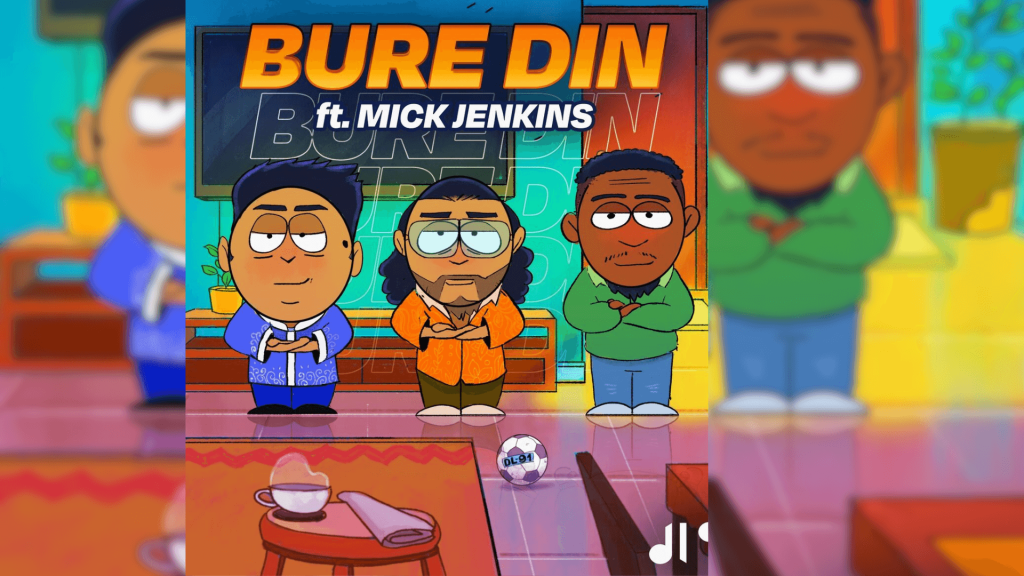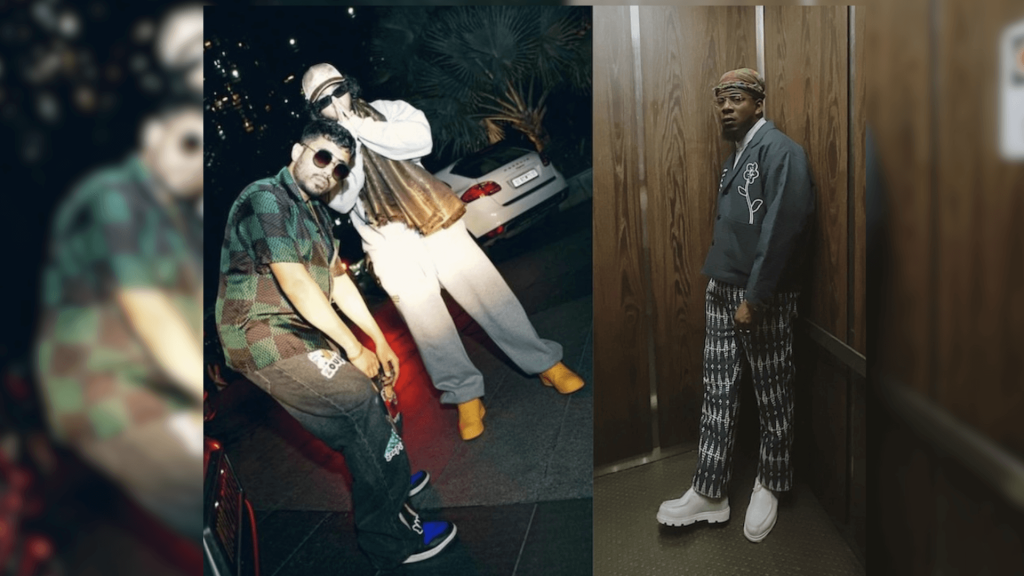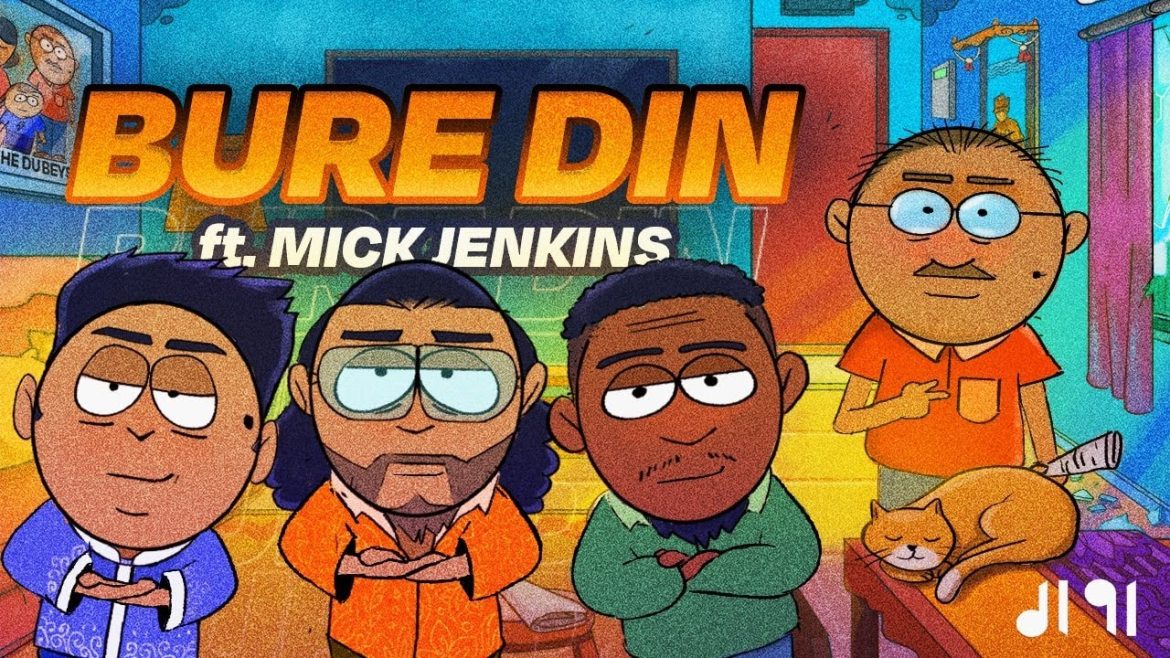Seedhe Maut has released a lot of tracks in their discography, but only a few hit as hard as Bure Din does when you are feeling low. Instead of making you hype up, this particular track makes you feel that Encore and Calm are right there with you, feeling the exact same things as you are.
It’s one of those timeless tracks that you play on loop while zoning out in a metro or having a really rough patch. Being the master of symbolism and deep meanings Seedhe Maut are, Bure Din is bound to have hidden meanings within its lyrics as well, and here is my interpretation of this classic.
Seedhe Maut Bure Din Lyrics and Breakdown

Intro: Encore ABJ
Haara nahi, haara nahi
Yeah, jo seekhta hai haar se—
Jo seekhta hai haar se, wo haara nahi
Jalta hai aap se, wo taara nahi
Jo seekhta hai haar se, wo haara nahi
Jo seekhta hai haar se, wo haara nahi
Jalta hai—
Hisab
The song starts with “Haara nahi,haara nahi,” declaring that Seedhe Maut is in the game and no matter what may come, they haven’t lost, and they won’t. They also remind us, the listeners of the song, that if you learn something from a loss, then you haven’t lost.
Chorus: Encore ABJ
This that cheers to my bure din
This that cheers to my buri raat
This that likhta hoon taaki tair paoon bina doobe aaj
Hello, mister Dubey, kya aap—
This is the chorus. Here, Encore celebrated his bad days and nights, finding comfort even in the struggle of life, and tries to make Mr. Dubey understand that he writes songs to keep his life afloat.
Now, we are not sure who Mr. Dubey is, but according to me and considering there was a picture on the wall mentioning the Dubey family in the song, Mr. Dubey is some sort of a father figure. Mr. Dubey can also be referring to the listener, or a third person, who is ‘drowning’ in emotions as a metaphor, taking over Dubey’s literal meaning from Hindi.
Verse 1: Encore ABJ
Dekh paa rahe ho mere aks ko?
Gaali-galauj se paar mere lafz ko?
Ladai-dhadaai se paar mere laksh ko?
Chudam-chudaai se paar mere waqt ko? Shaayad nahi
Jo seekhta hai haar se, wo haara nahi
Jalta hai aap se, wo taara nahi
Jalta hai aag se, hai taara wahi
Main jalta tha aashiki mein saara din
Pighalta tha aashiki mein saari raat
Teri-meri chhod, ye humaari baat hai
Teri-meri saans nahi, ye humaari saans hai
Hamaara lagaav hai, humaara khwab hai
Hamaara prasaad hai, hamaara paap hai
Jaan-e-jaan, bhagwan jaanta hai
Mere pyaar se shaitaan bhaagta hai
Mere pen ki lakeer se brahmand naap jaaye
Lekin likhta nahi hoon kyunki haath kaanpata hai ye wala fir
This is the first verse of the song. Here, Encore asks Mister Dubey whether he sees his reflection or the real him in his lines. He questions if Dubey can truly understand the depth of his verses, beyond just the curse words, and conveys to us that he thinks that mister dubey can’t really understand him.
Apart from this, he again mentions the fact that whoever learns from a loss hasn’t lost yet.”Jalta hai aap se, wo taara nahi, Jalta hai aag se, hai taara wahi”. This verse conveys one who burns out of jealousy isn’t a star but the one who shines by burning in fire is a true star.
After that, the imagery shifts to a consuming kind of love, which is emphasized by going beyond individual egos and embracing shared breath and dreams. This verse reaches an emotional peak when he says his love is so strong that even evil flees from it, but even after that, his hands tremble while writing, showing vulnerability.
Verse 2: Calm
Hello, mister doobe-aap
Hello, mister toote-aap
Hello, mister gaane-bana-rahe-the-jage-poori-raat
Hello, mister bade-khwab
Hello, mister fuck-it-up
Hello, mister gaane-to-yaad-hain-khud-hi-ko-bhoole-aap
Hello, mister fake-hai-love
Hello, mister shake-it-off
Hello, mister yahin-wo-rahe-to-hoge-poore-aap
Hello, mister tedhi-raah
Hello, mister faded-aap
Hello, mister nashon-mein-dhoondo-jo-kabhi-milen-na
Chaahiye thoda cash and I get by
Poore karoon plans so I can’t die
This that cheers to my bura time
This that cheers to my look-a-likes jinhein dikhe mere bhi bada bhai
Ye wala hai cheers to the fam, jo saath nahi chhode kabhi mera
Cheers to the land, jo paal ke kare bada mujhe
Cheers to the man, jo jaan ke deta salaah mujhe
Cheers to the stand I took, jab bura laga mujhe
Here, Calm has a self-conversation, speaking to himself through a series of “Hello, Mister” Dialogues. It is a reminder from the ambitious dreamer to his lost self in drugs and self-doubt. He confronts his struggles through this verse.
This verse mixes vulnerability and frustration, showing how easy it is to lose yourself. But then he shifts the tone and raises a toast to his bad times, to those who misunderstood him, to the unwavering support of his family, to his roots, and to the mentors who stood by him. Most importantly, he celebrates his resilience, the choice to take a stand when things felt unbearable.

Verse 3: Mick Jenkins & Encore ABJ
Took an E, took an A, took a R
Took an N, everytime I took a L
I was on the cusp but I really couldn’t tell
I was on the bus with a pocket full of drive
Didn’t talk too much when I had to sit still
Even keeled, if they mentioned my walk
Couldn’t expire but the pressure would mold
It would inspire all the questions I fought
Like why the bad prosper and why the good fold?
Or why the bill folds never fill up our pot?
Wasn’t blindfolded, they knew that we can see
Nicodemus, I question everything I was taught
All my dreams, they would seem outta reach
Same way, inseams wouldn’t reach, I was just too tall
Moving the needle, adjusting the hem
Piece it together, I’m quilting it all
No security blankets could keep it together
And we got the pressure of milking it all
Not too much leisure, a nigga been vetting his measurements, specially when mixing with y’all
I might take a breather but I ain’t gone let up these lessons, they definitely get written for y’all
Tabhi main likhta hoon, jitna main likh sakta hoon
Chahe Dilli ho ya fir Kasol
Ye wala hai—
This is the third verse where Mick Jenkins unleashes a highly introspective verse. It opens with a clever play on words
Taking “E”, “A”, “R”, and “N” every time he took an “L” (loss), showing how each setback was part of his journey toward earning something greater.
From being just a silent observer on a bus with nothing but an inner drive, to someone constantly being molded by the pressure of life, Mick Jenkins, in his verse, shows how struggle refines character. He reflects on existential questions like why do the corrupt succeed while the good suffer? Why does financial success remain out of reach for so many despite hard work?
Drawing on a biblical reference to Nicodemus, he hints at questioning long-held beliefs. His dreams once seemed out of reach, much like pants that didn’t fit, a metaphor for being “too much” for his circumstances. But instead of shrinking, he adapted without the comfort of “security blankets. ” He is constantly readjusting to his surroundings, and despite the weight and the weariness of it all, He remains committed to expressing these experiences through his writing. Encore ends this verse, mentioning this is why he is committed to his writing, whether he is in Delhi or anywhere else.
Verse 1: Encore ABJ
Samajh paa rahe ho?
Ladai-dhadaai ki baaton se, in club-clubon ki baaton se
In pyaari-pyaari shaklon ke peeche beech mein jo hum ghire pdhe hain uske paar dekh ke
Kya aap samajh paa rahe ho, mister Dube?
Kyunki cheezen sataati rahengi par hum cheezon ko sataate rahenge, aage aate rahenge
Apni khamiyon se khud ko behtar karte rahenge
Aur sab ki lekar rahenge
Sahte rahenge lekin doguna dekar rahenge
Jawaab, baat, khwab, pyaar, salika, vichar, shuruaat, ant
Main kabhi tha sober, kabhi tha bhand
Kabhi unhappy, ab dard mein bhi fun hai
Ab dard mein bhi fun hai, janaab
Ye wala hai cheers to my bure din
Ye wala hai cheers to my buri raat
Ye wala hai tairta hoon taaki likh paoon bina—
This is the song’s outro, where Encore again asks, “is he making sense?”. Through all the chaos of violence and clubbing, and their image in the public eye, he asks whether Mr. Dubey can make sense of him.
He looks at the nature of existence and calls it annoying, but ensures that it will be equally annoying by returning stronger. Encore confesses to sometimes being drunk and sometimes sober, weathering painful and pleasurable moments. However, he discovers solace in that pain. The song ends with a toast to his bad times, paying tribute to the hardships that made him who he is today.

This is a very classic Seedhe Maut song that makes use of metaphors and smart wordplay to prove a point. It doesn’t just flex lyrical skill but invites the listener into the minds of Encore, Calm, and Mick Jenkins as they wrestle with their identity and struggle.
However, it’s a pity that this song didn’t garner, at least at the time of its release, much attention due to their beef with SOS and got overshadowed by songs like “Kaanch ke Ghar”, and “Shutdown”, which again is a reminder of Seedhe Maut’s versatility.
With a knack for Desi Hip Hop, Aditya Kundal is a writer here at DHH Wave that believes in writing his mind out on his favorite artists, whether it be Seeedhe Maut or KR$NA.


Leave a Reply